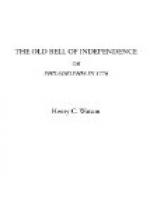“Washington was among the foremost in his endeavors to restore the fallen fortunes of the day, and, while exerting himself to rally his broken columns, the exposure of his person became so imminent, that his officers, after affectionately remonstrating with him in vain, seized the bridle of his horse. The retreat, under all circumstances, was quite as favorable as could be expected. The whole of the artillery was saved, and as many of the wounded as could be removed. The ninth Virginia regiment, under Colonel Mathews, having penetrated so far as to be without support, after a desperate resistance, surrendered its remnant of a hundred men, including its colonel, who had received several bayonet wounds. The British pursued but two or three miles, making prisoners of the worn-out soldiers, who, after a night-march of fifteen miles and an action of three hours, were found exhausted and asleep in the fields and along the road.
“I made a narrow escape from being taken by a party of dragoons. They were nearly upon a small body of us that had got separated from our division, before we perceived them. I gave the alarm, and we ran on, as we thought, toward our troops; but the fog was so thick that we mistook the way, and wandered about for some time in constant risk of being surrounded by the enemy. At length we stumbled on the main body of our line, and retreated with them. I never saw a more irritated and disappointed set of men than our officers on that day. Every one had a different cause for the repulse. Some said that Greene did not come up in time to aid Wayne and Sullivan; while others said that Greene had performed the most effective service during the engagement, and that the loss of the day was owing to the military prejudices of Knox and some others, who would halt to attack Chew’s house, instead of following up the advantages already gained. Then the fog was blamed for the confusion it caused. The fact was, the defeat was owing to many causes combined, some of which I have mentioned.”
“The attack was certainly skilfully planned and truly executed, in spite of its want of success,” remarked old Harmar. “Your opinion of the causes of the defeat, Mr. Smith, is that which is now generally adopted. The halt at Chew’s house did not give rise to the retreat of Sullivan’s division. The ammunition of the troops was exhausted, and they were not aware of Greene’s approach until they had begun to fall back. By the way, did you hear how General Nash was killed?”




